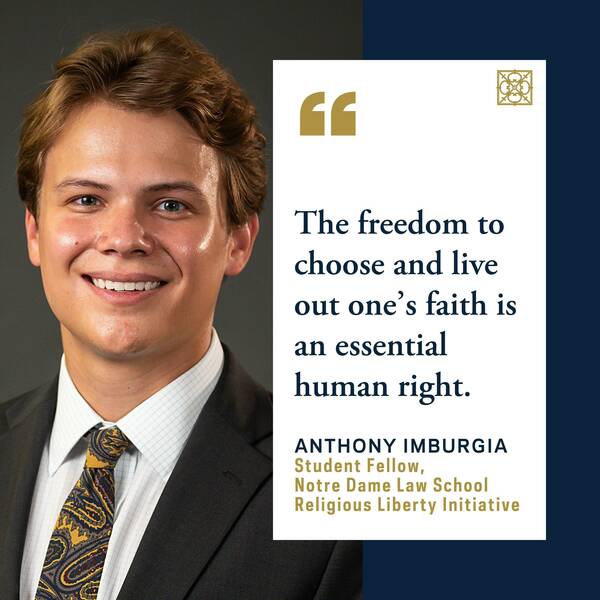Notre Dame Law School’s Religious Liberty Clinic represents client in asylum proceedings before the Immigration Court

Notre Dame Law School’s Religious Liberty Clinic represented an Iranian convert to Christianity in his asylum proceedings before the Executive Office for Immigration Review (EOIR). The Religious Liberty Clinic represented the client before the Santa Ana, California Immigration Court at a hearing this week.
The clinic’s client could legally be put to death for his conversion or any type of outward religious expression in Iran. The client requested asylum at the U.S. border and was detained for several months. He was released on parole with instruction to attend his hearing after he established a credible fear of persecution on account of his conversion to Christianity.
Religious Liberty Clinic student fellow Anthony Imburgia represented the client at a hearing this week. Student fellows Rohan Vaidya and Holly Fulbright also assisted with the case.
"The freedom to choose and live out one’s faith is an essential human right,” said Imburgia. “Asylum status in the United States provides freedom of religion for those to whom this right has been denied under fear of persecution.”
At the hearing, the Religious Liberty Clinic entered pleadings and indicated that the clinic’s client will be proceeding with an application for asylum, witholding of removal, and protection under the Convention Against Torture (CAT).
The Religious Liberty Clinic student fellows are delving into international refugee law and its application to U.S. asylum adjudication.
The judiciary in Iran follows sharia (Islamic law), which is strictly enforced. The law prohibits Muslims from changing or renouncing their religious beliefs. The only recognized conversions are from other religions to Islam. Sharia, as interpreted by the government, considers conversion from Islam apostasy, a crime punishable by death.
According to the 2022 Report on International Religious Freedom, the law in Iran prohibits non-Muslims from engaging in public persuasion or attempting to convert a Muslim to another faith or belief. These activities are considered to be proselytizing and punishable by death. Moreover, citizens who are not recognized as Christians, Zoroastrians, or Jews may not engage in public religious expression, such as worshiping in a church or wearing religious symbols.
“In the fight for international religious liberty, we are often constrained by the reality of sovereignty or the right of a country to make and enforce the laws of their choosing,” said Kimberlie Orr, the international legal fellow of Notre Dame Law School’s Religious Liberty Clinic. “Although the right to conversion is a protected human right through Article 18 of the International Covenant on Civil and Political Rights (ICCPR), many people are legally sentenced to death under charges of blasphemy and apostasy throughout the world. Through our clinic's representation of asylum seekers in the United States, our students fight for tangible protection and safe harbor for individuals seeking to freely live and express their religious identity.”
Imburgia added, “I am proud to have advocated for our client’s right to practice his faith, and I am grateful to the Notre Dame Religious Liberty Initiative, my professors, and our team of student fellows for this opportunity.”
About the Notre Dame Law School Religious Liberty Clinic
The Notre Dame Law School Religious Liberty Clinic represents individuals and organizations from all faith traditions to promote not only the freedom for people to hold religious beliefs but also their fundamental right to express those beliefs and to live according to them. Students in the clinic work under the guidance of Notre Dame Law School faculty and staff to provide advice, counsel, and advocacy on a broad array of matters related to religious freedom in the United States and abroad. The Religious Liberty Clinic has participated in proceedings at all levels of federal and state courts, in administrative agencies, and before foreign courts and other governmental bodies around the world.
Learn more about the Religious Liberty Clinic at religiousliberty.nd.edu/clinic/.
Originally published by at religiousliberty.nd.edu on September 15, 2023.